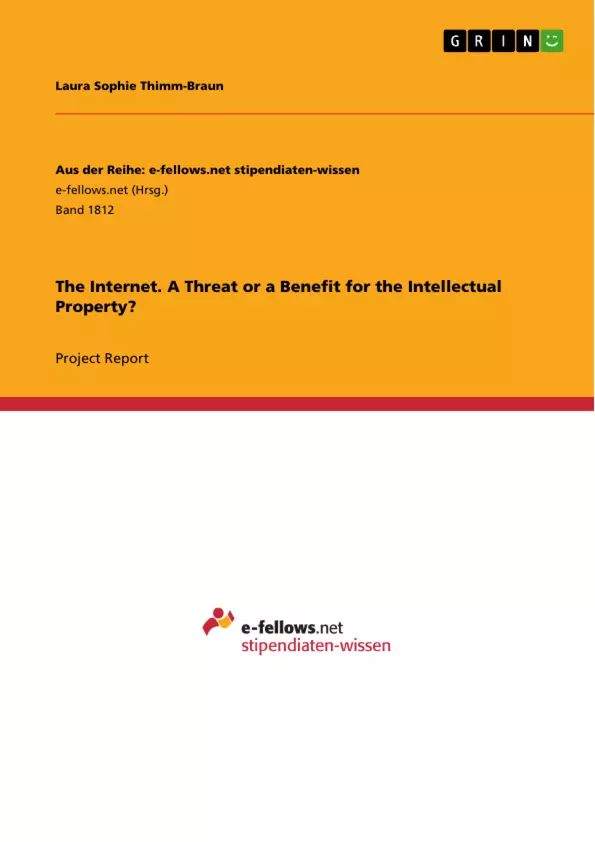Over the last few decades the digital media became a new form of communication. It is now impossible to imagine a life without the use of CDs, DVDs, USB drives and the Internet. Digital media and communication networks are creating a significant difference for international exchange and technological development. The term of “digital media products” refers to”intellectual products made available in digital electronic form, whether operational in computers or other machines capable of reading works in digital form“.
Especially for the economic flow it is of great importance to support the safety of digital media. In this context, however, many conflicts have come up, most recently on the issue of online privacy and property rights. They are expressed in contradicting interests of intellectual property rights-holders and the general public. On one hand it is necessary to protect the original creative investment and enable legal reuse of works. On the other hand the interest of intellectual property right holders and users must be recognized. In order to achieve a balance between these contradicting interests an adaption of the legal backdrop in respect of property laws to the new media cultures is necessary. Current jurisdiction, as will be argued in this paper, can not yet cover the new patterns of use on the Internet.
Inhaltsverzeichnis (Table of Contents)
- I. Introduction
- II. Intellectual Property
- 1. Historical and Philosophical Background
- a. Definition
- b. Social Approach
- c. Economic Approach
- aa. Property Theory
- bb. Property Rights Theory
- 2. The Internet and its Possibilities
- a. The Role of Technological Innovations
- 3. Copy Right of Copy Left
- 4. Intellectual Property in the German Constitution
- 5. Future Possibilities
- 1. Historical and Philosophical Background
- III. Conclusion
Zielsetzung und Themenschwerpunkte (Objectives and Key Themes)
This paper aims to explore the complex relationship between the internet and intellectual property rights, examining whether the digital world poses a threat to or a benefit for intellectual property. The focus is on understanding how the internet has impacted the traditional notions of ownership and access to creative works.
- The historical and philosophical foundations of intellectual property.
- The impact of technological innovation on the digital environment and its implications for intellectual property rights.
- The conflicting interests of intellectual property right holders and the public in the digital age.
- The need for adapting legal frameworks to accommodate the evolving patterns of digital media use.
- The potential of the internet for facilitating both protection and misuse of intellectual property.
Zusammenfassung der Kapitel (Chapter Summaries)
- Introduction: This chapter introduces the concept of digital media and its impact on communication and exchange. It highlights the growing tension between intellectual property rights and the interests of the public in the digital realm, emphasizing the need for adapting legal frameworks to address these challenges.
- Historical and Philosophical Background: This section explores the origins and evolution of intellectual property concepts, tracing their roots back to 19th-century European theories of copyright and personality rights. It examines both social and economic perspectives on intellectual property, highlighting key figures like Kant and Locke.
- The Internet and its Possibilities: This chapter delves into the transformative role of technological innovations in the digital age. It discusses the impact of the internet on the creation, distribution, and consumption of creative works, highlighting the new challenges and opportunities it presents for intellectual property rights.
Schlüsselwörter (Keywords)
The core keywords and focus topics of this text are: intellectual property, copyright, digital media, internet, technological innovations, online privacy, property rights, social and economic approaches, digital revolution, access to information, legal frameworks, conflicting interests, creative works, and the future of intellectual property.
Frequently Asked Questions
How does the internet affect intellectual property rights?
The internet creates a conflict between the protection of original creative investments and the public's interest in free access and reuse of works.
What is the "digital media products" definition used in the paper?
It refers to intellectual products available in digital electronic form that can be read by computers or similar machines.
Which philosophical approaches to property are discussed?
The paper examines social and economic approaches, including theories by philosophers like John Locke and Immanuel Kant.
Is current jurisdiction sufficient for the digital age?
The paper argues that current jurisdiction cannot yet fully cover the new patterns of use and media cultures emerging on the internet.
What is the difference between "Copy Right" and "Copy Left"?
The paper explores these as opposing concepts: traditional strict protection versus models that allow for freer distribution and modification.
- Citar trabajo
- Laura Sophie Thimm-Braun (Autor), 2013, The Internet. A Threat or a Benefit for the Intellectual Property?, Múnich, GRIN Verlag, https://www.grin.com/document/323071



